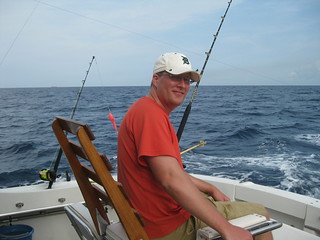Are you considering getting into a new hobby that you can pass on to future generations? Consider taking up fishing. Everyone in your family can enjoy fishing, from your child to your grandfather. Whether you are an amateur or a professional fisherman, this article will help you learn some new techniques.
Fishermen should always wear clothes that blend into the scenery. While fish may not have terrific vision, they can see colors, and therefore may be frightened by vibrant clothing. Use neutral tones that blend into a natural background.
Fishing along the shoreline of a river or lake can yield amazing results. Fish who depend upon insects for food generally find them in abundance close to the shore, so you may get more bites by casting your lure in these areas. The number of weeds along the shore make snagging your line more likely, so be careful.
Stream fishing requires you to cast upstream, then allow the current to bring your bait downstream. This technique will make it more likely for you to get a bite. Try to always keep your line taught, and reduce the slack in your line so you can feel the fish bite.
Whether it’s sunny outside or not, it’s always a good idea to bring sunscreen along. Water can have a stronger effect with the reflection on the water, producing a painful sunburn for you, if you are not protected.
You can determine which way to cast by studying the seasonal migration pattern of fish. If the fish are going upstream in the spring, you would cast ahead of them as they go “uphill”. In the fall, the fish will be moving in the other direction, and thus you should fish downhill.
Always be aware of the laws regarding fishing in any particular area. While some areas may not let you fish in a certain river or lake, others may prohibit certain bait. One way to ensure that you are following the fishing laws is to speak to local government agencies.
Fly Fishing
If fly fishing, avoid wind. Casting won’t have as much accuracy on a windy day. Fly fishing is usually best during early morning or later in the evening when it is less windy. If it gets too windy simply turn your back towards the wind and fish.
Clouds are good for you when you are fishing. Cloudy days tend to cast shadows over the water, meaning that fish are spending more time searching for food. Bright colored or scented baits may work better on cloudy days to help the fish find them. Be certain that the water is of high enough temperature for the fish to be swimming.
When it comes to live bait, smallmouth bass and walleyes can be pretty picky. Consider packing several different baits, such as leeches, in case the fish you are seeking are particular. They will stay alive for a long time (overnight) if you put them in a plastic or Styrofoam container with air holes and a little water.
If you are doing catch-and-release fishing, take care not to fight with the fish you hook. In a lot of cases, the fight will exhaust the fish or cause injuries. Let the fish go immediately, instead of potentially killing it during a fight.
Do not panic if you hook a large fish. There will probably be a fight. Do not try and reel the fish in or you will break your rod. Set your drag, waiting until the fish tires before reeling it in.
Be cautious of fish and their teeth. Fish like walleye and pike can leave a big bite mark. The two species are known for their sharp teeth, and they won’t hesitate to bite you. Once you know it is dead, grasp the fish’s stomach and detach the hook. If you want to release the fish, wear gloves to remove the hook.
By following the information provided here, and continuing to practice and learn, you can look forward to a lifetime of fishing fun. So ask your friends and family to join you, and let the bonding begin. You will be having fun and creating lasting memories too.
